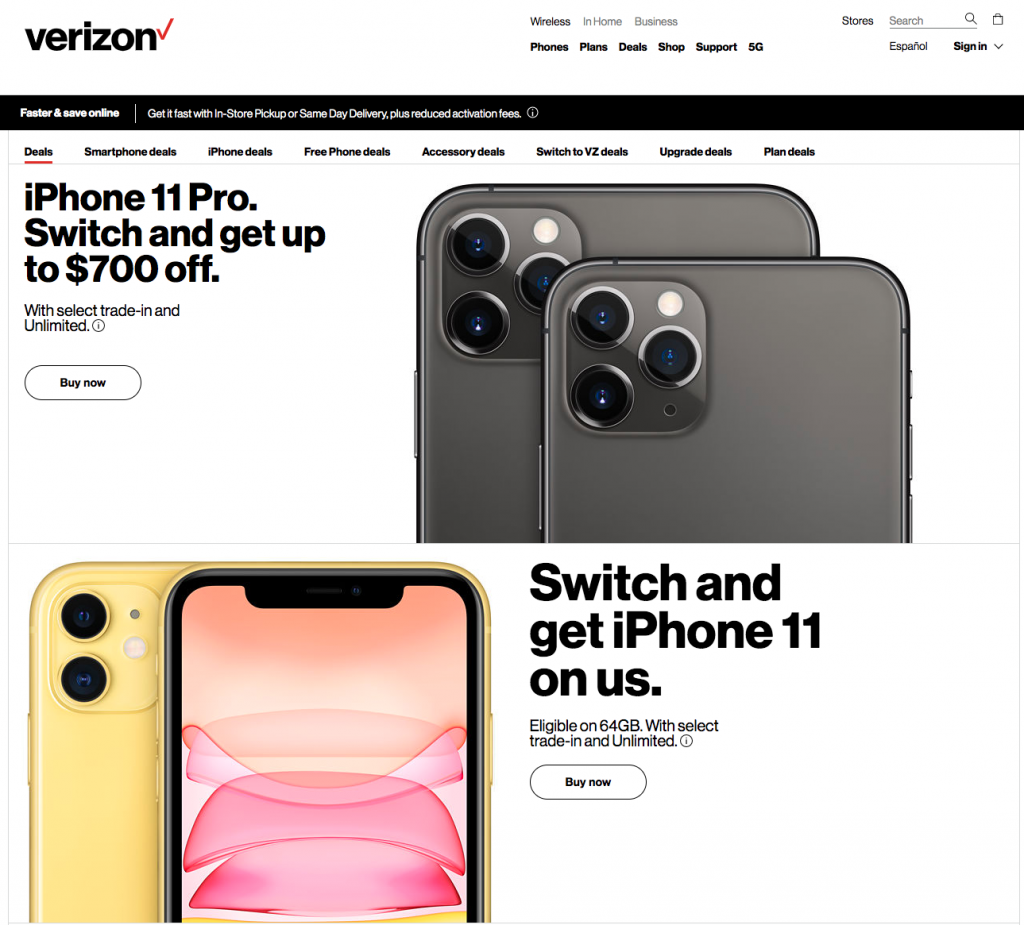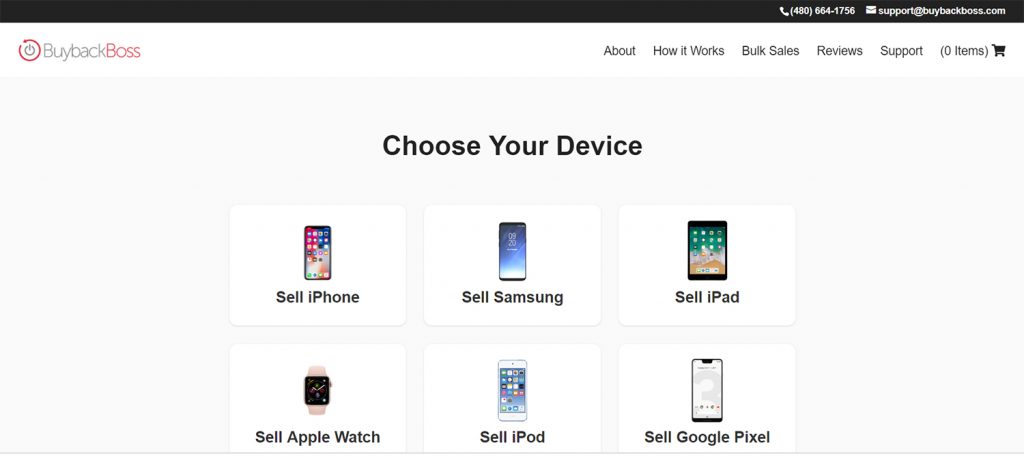Verizon iPhone Upgrade Program – The Complete Guide
It goes without saying that Verizon is one of the most popular cellphone carriers in the American marketplace. It’s actually in the top 3 alongside AT&T and T-Mobile. With almost one-third of the entire cellphone industry’s market share, and with some of the widest overall coverage in the United States, it makes sense that you want to stick with Verizon as a carrier or switch over to them. However, when the time comes to upgrade your phone, what does Verizon offer you in terms of an upgrade incentive?
Upgrading Your iPhone Through Verizon
Upgrading your smartphone used to be a ubiquitous process that all smartphone consumers eagerly benefited from. If you used a cellphone as recently as 5 years ago, then you surely remember the days of “upgrading” your cellphone through Verizon’s rather generous subsidization process. However, that program has changed profoundly in the last few years, making it important to understand what you’re doing when you upgrade your iPhone using Verizon’s upgrade program.

How Upgrades Worked Back in the Day
It used to be, that at the end of your 2-year contract with Verizon, you’d be offered an upgrade incentive as the company’s means of enticing you to resign a cellphone contract for another 2 years. Verizon wanted to ensure they had you as a customer for 2 more years and, in return, they offered an incentive to get you to do so. It was a great, symbiotic relationship of “if you pat my back, I’ll pat yours.”
The truth is, the full retail price of an iPhone was always incredibly high. If you maxed out the specs on your new iPhone, you would effortlessly exceed the $1,000 price point we all scoff at today. But the sting of buying a luxury smartphone was somewhat soothed by being eligible for an “upgrade” through Verizon. When your 2-year contract was up, Verizon would mark your line as eligible for an upgrade, this would turn that $700 iPhone into a $250 iPhone with almost no strings attached. It made your consumer technology addiction much easier to feed.
“Almost no strings attached” comes with its caveats, of course. But all you were doing, when you took advantage of an iPhone upgrade, was renewing your 2-year contract. In most cases, your phone bill stayed the same (save for a one-time activation fee) and you had the option of paying for your subsidized iPhone upfront or tacking it onto your next bill. Once you paid the nominal price for your new iPhone you were completely paid up, end of story.
The only conceivable downside to renewing your 2-year contract with Verizon was the possibility of an early termination fee. Essentially, Verizon reserved the right to charge you a hefty fee (often as much as $350, depending on how much time is left on your contract). So if you were thinking of switching carriers mid-contract, you’d want to think again.
How iPhone Upgrades Work Now
Today, Verizon iPhone upgrades look completely different. Gone are the days of subsidized phones. Verizon, along with the other top 3 carriers in the United States saw the writing on the wall; people were buying iPhones no matter what, and they weren’t too concerned with the price if it was spread out over the life of their phone bill.
Yes, after 2 years, your Verizon contract will still expire. But what is the incentive to renew that contract? In truth, there isn’t one. You’re still going to get slapped with the full retail value of that new iPhone. Even worse, the newest iPhones come in at $1,000 right out of the gate.
Verizon and other cellphone carriers are banking on peoples’ lack of impulse control and so far, it looks like they’re right. Eventually, you’re going to buy a new iPhone, no matter the cost. And just how we feel a bit better about that 80” LED television or that king-sized memory foam mattress when we pay it off, no interest, in monthly installments, we are all too eager to keep the gigantic cost of our iPhone XS out of sight, out of mind via our monthly phone bill.
Worst yet, renewing your 2-year contract with Verizon could make you subject to new terms enacted by the cellphone company while you were on your old contract. In most cases, even if your contract is expired, you’re grandfathered into previous terms on your contract and immune to any new terms and conditions until you renew your contract. Many people felt this when Verizon dropped all of their unlimited data plans years ago—they noticed that, as long as they did not renew their expired data that they could benefit from unlimited data. But, once they upgraded their iPhone and subsequently signed a new contract, their unlimited data went the way of the subsidized iPhone—into thin air.
The Benefits of Using the Verizon iPhone Upgrade Program
Are there any benefits at all to upgrading (and renewing your 2-year contract) on a Verizon plan? The only benefit you’ll receive is the benefit of a brand new iPhone. Verizon doesn’t offer you an incentive to upgrade. Their “2-year contract” is mostly a superfluous feature that a lot of people completely ignore.
You can stay on an expired Verizon contract for as long as you want. Most people unwittingly renew their contracts because they’re getting a new iPhone. But if you’re still using that trusty iPhone 6s Plus, then you may be surprised to learn that you’ve been “out of contract” with Verizon for close to 4 years now and no one cares. Upgrading and renewing your Verizon contract isn’t necessarily a bad thing. Depending on your current terms, you might not even see any changes. And whether you want to or not, upgrading your iPhone (or any smartphone) is going to renew your contract with Verizon.
Who Benefits Most
While the benefits of upgrading your iPhone on Verizon are slim to none (barring the benefits that a new iPhone will give you), it may benefit you to switch carriers and upgrade your iPhone that way. Sometimes Verizon will even offer to pay your early termination fee if you switch from your current plan to one of theirs. You just need to ensure that you’re going from Sprint or another carrier that uses CDMA cellular technology and is this cross-compatible with your iPhone’s sim technology.
What is CDMA?
CDMA stands for “Code Division Multiple Access” and it’s the cellular technology used by both Verizon and T-Mobile as well as a few lesser-known carriers in the United States. It’s a distinct technology in the sense that you cannot use a CDMA (Verizon) iPhone on a GSM network (AT&T and T-Mobile).
What is GSM?
GSM stands for “Global System for Mobile” and it’s the cellular technology used by both AT&T and T-Mobile as well as a few lesser-known carriers in the United States. You cannot switch from Sprint or Verizon to AT&T or T-Mobile or vice versa—they simply aren’t compatible with each other.
Switching Carriers to Upgrade Can Sometimes Work

Going back to upgrade incentives—occasionally, switching carriers as a means to “upgrade” your iPhone can work in your favor. Upgrading via the cellphone carrier you’re already using may offer you no incentive, but Verizon would be much more interested in having you jump on board from another carrier such as Sprint.
First, ensure that you’re either out of contract with Sprint or that Verizon is willing to pay your early termination fee. Once you’ve squared that away, it’s worth it to speak to a Verizon sales representative either over the phone or in person at a Verizon store. Tell them you’re thinking of switching to Verizon and want a new iPhone and see what they can offer you. They may offer a subsidized price and upgrade your iPhone for you because you’re a new customer.
If doing this transaction in-person at a Verizon store, it’s worth noting that the representative you’re speaking to has plenty of incentive to get you signed onto a brand new contract. New contracts are a huge employee metric at Verizon—the opportunity to bring in a new customer will look good for that sales rep, so see what they’ll offer you in exchange for the honor of signing you into a contract. Verizon has plenty of promotions for new customers that aren’t well-advertised. Who knows; you may snag a new iPhone at a substantial discount.
Alternatives to the Verizon iPhone Upgrade Program

While the days of upgrading your iPhone with Verizon are mostly, gone, it’s worth remembering that there are alternatives to a subsidized iPhone. It’s easy to forget the inherent value in the long-in-the-tooth iPhone that’s been sitting in your pocket for 2+ years. And while you’ve grown tired of that iPhone, there is still a market for it.
Your iPhone, assuming it’s in relatively good cosmetic condition, can be traded in via an iPhone buyback program like Gazelle or Buyback Boss. These companies will pay you for your old iPhone, sometimes more than $100 depending on the model.
Trading in your iPhone is a great strategy for reducing the financial burden of a new iPhone. It gives you a little more leverage when upgrading your iPhone—if you’re willing to buy your new iPhone at full retail price from Apple or a big box retailer, then you can escape the need to renew your Verizon contract entirely. After all, the price of an iPhone is going to be the same whether you buy it through Verizon or straight from Apple or in-person at a place like Best Buy. Regardless of where you decide to buy your iPhone—shop around, as many of these companies will offer random promotions and sales, which will save you even more money.
Upgrading your Verizon iPhone may not be the exciting and thrifty process that it once was, but if you remember to trade in your old iPhone via an iPhone buyback program and look out for sales and promotions on the newest iPhone, then you may come close to the glory of the iPhone upgrade pricing of yesteryear.

